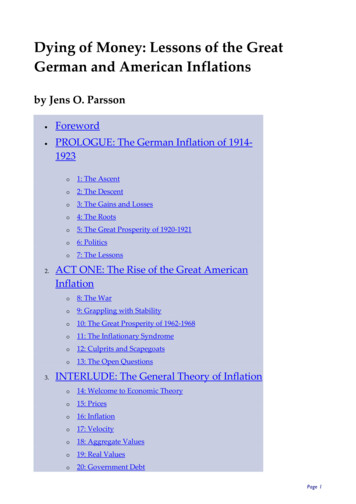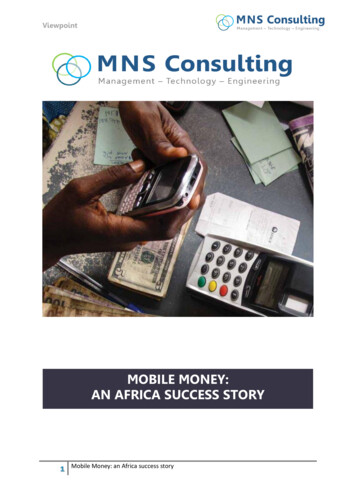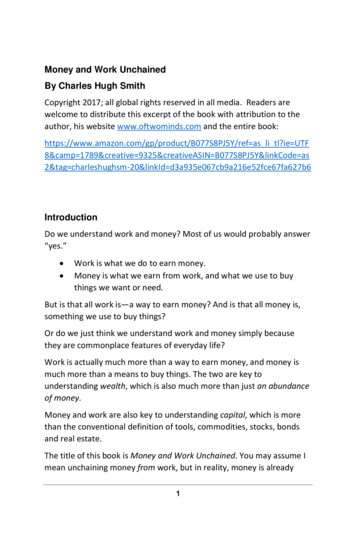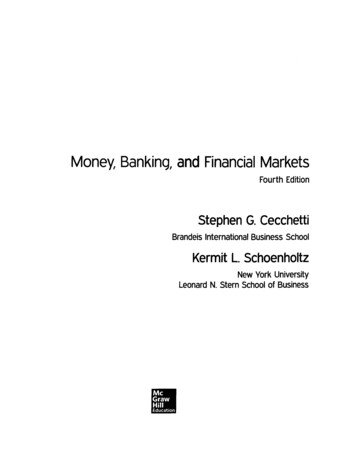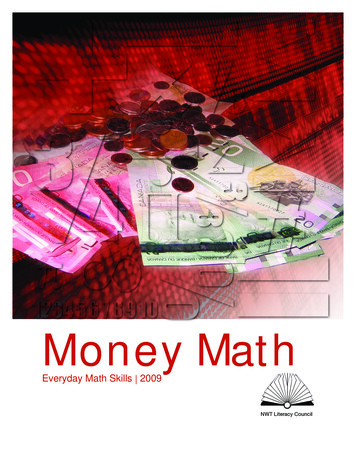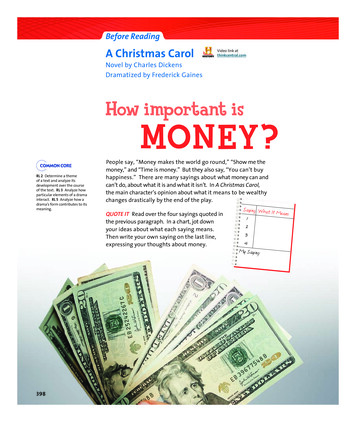
Transcription
CDETB October 2011 - Level 3 QQI Managing Personal Finances 3N0921Programme ModuleManaging Your Moneyleading toLevel 3 QQI Component: Managing Personal Finances 3N0921Page 1 of 201
CDETB October 2011 - Level 3 QQI Managing Personal Finances 3N0921Please note the following prior to using this programme module descriptor: This programme module can be delivered as a stand alone module or as part of the:1. Level 3 QQI Certificate in General Learning 3M08742. Level 3 QQI Certificate in Employability Skills 3M09353. Level 3 QQI Certificate in Information and Communication Technologies 3M0877. Upon successful completion of this programme module the learner will achieve 10 credits towards theLevel 3 QQI Certificates in General Learning, Employability Skills or Information and CommunicationTechnologies. The learner needs to accumulate a minimum of 60 credits in order to achieve the Level 3 QQI Certificatesin General Learning or Employability Skills or Information and Communication Technologies. Teachers/tutors should familiarise themselves with the information contained in CDETB’s programmedescriptor for Everyday Living Skills, Skills for the Workplace or Introduction to Information andCommunication Technologies prior to delivering this programme module. In delivering this programme module teachers/tutors will deliver class content in line with the Guidelinesfor Teaching and Learning included in this programme module. In assessing the learner, teachers/tutors will assess according to the information included in thisprogramme module. Teachers/tutors are required to devise Assessment Briefs for the Collection of Workand the Skills Demonstration. Where overlap is identified between the content of this programme module and one or more otherprogramme module(s), teachers/tutors are encouraged to integrate the delivery of this content. Where there is an opportunity to facilitate the learner to produce one piece of assessment evidencewhich demonstrates the learning outcomes from more than one programme module, teachers/tutors areencouraged to integrate assessment.Page 2 of 202
CDETB October 2011 - Level 3 QQI Managing Personal Finances 3N0921Overview of the Programme ModuleThe Programme Module is structured as follows:Section 1 to 8: contains important information for the teacher/tutor about the credit value, title, code, etc. of theprogramme module.Section 9: details the learning outcomes prescribed for the programme module by QQI. These outcomes are setby QQI and cannot be changed in any way by the CDETB or individual teachers/tutors.Section 10: outlines suggestions and guidelines for teaching the module. It contains useful information and ideasfor teachers/tutors and can be helpful in clarifying learning outcomes.Section 11: contains the relevant information in relation to the assessment of the module. As the teacher/tutor isthe assessor of the work, this section is essential reading.Section 11a specifically prescribes the way in which learners are required to present evidence for assessment.Learner Marking Sheet: this is the marking sheet that must be attached to the assessment portfolio and signed bythe teacher/tutor and the learner.Page 3 of 203
CDETB October 2011 - Level 3 QQI Managing Personal Finances 3N0921Programme ModuleAward1. Title of Programme ModuleManaging Your Money3. Duration in Hours of Programme Module1005. Assessment TechniqueCollection of Work 100%2. Component Name and CodeLevel 3 Managing Personal Finances 3N09214. Credit Value106. Specific RequirementsCentres must have access to the range of services,professional products, tools, materials and equipment toensure the learner has the opportunity to cover all of thepractical activities.7. Aims of the Programme ModuleThis programme module aims to equip the learner with the knowledge, skills and competencies to managepersonal finances.8. Objectives: to provide an understanding of personal and cultural values surrounding moneyto develop budgetary skills in the areas of spending and savingto provide an understanding of relevant social welfare systems, payslips and consumer rights9. Learning Outcomes of Level 3 Managing Personal Finances 3N0921The learner will be able to:1. discuss personal and cultural values surrounding money to include personal money and money belongingto other people or organisations2. explain a personal budget to include income and expenditure3. identify basic tax and social welfare deductions on a payslip4. distinguish between current financial needs and future spending to include bills, necessities, discretionaryspending and large expenditures5. identify common social welfare entitlements6. describe ways of managing payments, payment methods and costs incurred by various methods7. give examples of the agencies that provide support during financial difficulty8. demonstrate knowledge of consumer rights and the available mechanisms to exercise them9. prepare a weekly spending plan10. identify ways of saving money11. prepare a savings plan12. describe the economic and social environment and its impact on personal finances13. compare a limited range of savings and borrowing products from financial institutions14. compare personal financial experience and habits with those of dependents, partners, family and friends.Page 4 of 204
CDETB October 2011 - Level 3 QQI Managing Personal Finances 3N0921Delivery Strategies and Learning ActivitiesThis programme module could be delivered through classroom-based learning activities, teamwork, groupdiscussions, one-to-one tutorials, field trips, case studies, role play, teamwork and other suitable activities.10. Guidelines for Teaching and LearningPlease note: the following guidelines suggest a sequence for the teaching of this module. In some cases, this maydiffer from the sequence of learning outcomes outlined in section 9.Personal and cultural values surrounding moneyLearning Outcome 1: Discuss personal and cultural values surrounding money to include personal money andmoney belonging to other people or organisations.* It should be noted that sensitivity and confidentiality are important for teacher/tutors to bear in mind whenapproaching topics of a personal nature. Use case studies and the groups experiences (make it clear that learnerscan choose if they want to share information)In order to help the learner achieve Learning Outcome 1 in particular, consider doing the following: explore with the learner personal and cultural values surrounding money, Including personal money andmoney belonging to other people or organisations. explore with the learner the meaning of:o personalo culturalo organisation.What is personal money (money belonging to you)?Examples: wages job seekers allowance / benefit child benefit savings pensionWhat money belongs to other people?Examples: their wages their savings their allowancesWhat is organisational money? private business public business (state owned)A personal budgetLearning Outcome 2: Explain a personal budget to include income and expenditure.In order to help the learner achieve Learning Outcome 2 in particular, consider doing the following:Page 5 of 205
CDETB October 2011 - Level 3 QQI Managing Personal Finances 3N0921 explore with the learner a personal budget to include income and expenditureWhen discussing personal money it may be advisable for the tutor to use a case study.One idea is to create a case study using a fictitious person developed by the learner/s and their circumstances andtheir income and outgoings. Take into account age, circumstances etc.IncomeWages ExpenditureFoodBenefits (explore what type)ChildcarePocket moneyHeatingPensionsGoing out TelevisionMedicalTotalTotalIdentify basic tax and social welfare deductions on a payslipLearning Outcome 3: Identify basic tax and social welfare deductions on a payslip.In order to help the learner achieve Learning Outcome 3 in particular, consider doing the following: explore with the learner how a payslip worksExample (this can be cut and pasted to create different payslips)Page 6 of 206
CDETB October 2011 - Level 3 QQI Managing Personal Finances 3N0921PAYSLIPThe Furniture Warehouse EMP REG 1234567.PERIOD1PAY DATE31/01/12NAMEWORKERS NODEPTPPS NOFinnegan JamesA00006Floor2596846BPAYMENTSBasic PayDEDUCTIONS500.00YEAR TO DATEYEAR TO DATEPAYE45.00PRSI15.00Gross PAY500.00USC20.00PAYE45.00PRSI15.00Insurable weeks1Tax Credit60.00Cut Off560.00This EmploymentGross Pay500.00PAYE-45.00PRSIThis PeriodSummary of Payments Summary of Deductions-15.00AllowableTaxable pay500.000.00Taxation BasisCumulative00.00PRSI ClassA1DeductionsAllowableDeductions0.00Non AllowDeductionsUSCPAYE PRSIGross Pay500.0080.00 USCNon taxablepaymentsTotalDeductions-20.0080.00NET PAYNotes420.00Page 7 of 207
CDETB October 2011 - Level 3 QQI Managing Personal Finances 3N0921Current financial needs and future spendingLearning Outcome 4: Distinguish between current financial needs and future spending to include bills, necessities,discretionary spending and large expenditures.In order to help the learner achieve Learning Outcome 4 in particular, consider doing the following: explore with the learner the difference between current financial needs and future spending to includebills, necessities, discretionary spending and large expenditures.Things to consider (this list is not exhaustive and the learner should be encouraged to come up with own list)Current NeedsFood Future l TelevisionMedicalCommon social welfare entitlementsLearning Outcome 5: Identify common social welfare entitlements.In order to help the learner achieve Learning Outcome 5 in particular, consider doing the following: explore with the learner up to date common social welfare entitlementso what are theyo where to get informationo where to get help.You can use case studies to explore this.Helpful website: www.welfare.iePage 8 of 208
CDETB October 2011 - Level 3 QQI Managing Personal Finances 3N0921Managing payments, payment methods and costs incurredLearning Outcome 6: describe ways of managing payments, payment methods and costs incurred by variousmethodsIn order to help the learner achieve Learning Outcome 6 in particular, consider doing the following: explore with the learner ways of managing payments, payment methods and costs incurred by variousmethodsWhat is a payment method? A payment method is how you pay for an item or loan that you havebought. This will depend on the seller. Every seller is unique and offers different methods of payment.Examples: this list is not exhaustive. The learner should be encouraged to come up with own ideas.Methodo casho debit cardo credit cardo loanThings to consider (this list is not exhaustive and the learner should be encouraged to come up withown list)ExampleItemFood CashSelling price 50.00Interest00.00End cost 50.00HolidayVisa 100.0010% 110.00Car (simple interest)Loan 5,00020% 6,000.00It costs more the longer you take to pay off a loan.How do you manage a paymento weekly (loan)o monthly (credit card or loan)As a general rule, the amount you can afford to borrow depends on how much you can comfortably payback.Helpful website: www.itsyourmoney.ieFinancial SupportLearning Outcome 7: Give examples of the agencies that provide support during financial difficulty.In order to help the learner achieve Learning Outcome 7 in particular, consider doing the following: explore with the learner agencies that provide support during financial difficulty.Things to consider (this list is not exhaustive and the learner should be encouraged to come up withown list).o MABS -Money Advice and Budgeting Service (Ireland) www.mabs.iePage 9 of 209
CDETB October 2011 - Level 3 QQI Managing Personal Finances 3N0921o Mortgage broker lender www.keepingyourhome.ie It is important that any one who is in financial difficulty seeks help. A case study could be useful as learners can offer advice. Consumer rightsLearning Outcome 8: Demonstrate knowledge of consumer rights and the available mechanisms to exercisethem.In order to help the learner achieve Learning Outcome 8 in particular, consider doing the following: explore with the learner consumer rights and the available mechanisms to exercise them.Consumer Protection Act, 2007Some of the areas covered by consumer protection (this list is not exhaustive)o buying a caro advertisingo toy safetyo small claims courto consumer law and priceso sale of goods acto package holidaysExamples of support agencies,(this list is not exhaustive). ct.ieA weekly spending planLearning Outcome 9: Prepare a weekly spending plan.In order to help the learner achieve Learning Outcome 9 in particular, consider doing the following: explore with the learner how to prepare a weekly spending plan.For a group activity you can use a case study.Weekly plan, this list is not exhaustive and the learner should come up with own ideas.Weekly spendFood BillsTravelCigarettesGoing outChildcarePage 10 of 1020
CDETB October 2011 - Level 3 QQI Managing Personal Finances 3N0921Ways to save moneyLearning Outcome 10: Identify ways of saving money.In order to help the learner achieve Learning Outcome 10 in particular, consider doing the following: explore with the learner ways of saving money.Some tips (this list is not exhaustive).o Go shopping on a full stomach and with a list.o Use cash and only spend what you’ve got.o Put a curtain up behind your front door – keep out draughts, sometimes the old ways are best!o Do not leave electrical items on standby, it means they are still using electricity.o Check out which evening the cinema has reduced tickets (usually mid week) and see the film then– also buy popcorn and drinks in the supermarket before you go.o Turn the heating off half an hour earlier, put a jumper on, and snuggle up on the sofa under ablanket (kids love this – camping in the living room!)o Always check your till receipt and change – mistakes are made more often than you think.o Put your spare change in a jar. It is amazing how much you can save.Types of savings accounts:o credit unionso bankso state saving schemesHelpful website: www.itsyourmoney.iePrepare a savings planLearning Outcome 11: Prepare a savings plan.In order to help the learner achieve Learning Outcome 11 in particular, consider doing the following: explore with the learner how to prepare a savings plan.EMERGENCY SAVINGS:Emergency savings for things that come up unexpectedly.SHORT TERM SAVINGS:Short Term Savings involve setting aside funds for something we will need in less than a year. This couldinclude saving for a new sofa, vacation, or even Christmas gifts. If you can set aside money over time forthese items, you will be saving greatly over high interest rate credit cards. It really pays to plan ahead.LONG TERM SAVINGS:This will include large items we are saving for which are more than a year in the future. This would includesaving for items such as a down payment on your first home, your children's college education, and yourPage 11 of 1120
CDETB October 2011 - Level 3 QQI Managing Personal Finances 3N0921retirement.When preparing a savings plan:o look at your incomeo look at your outgoingso what can you cut back ono plan in advanceo take into account things like a family wedding, communion, or your debs. a holiday with your family or friends. buying a car. education clothes.The economic and social environment and its impact on personal financesLearning Outcome 12: Describe the economic and social environment and its impact on personal finances.In order to help the learner achieve Learning Outcome 12 in particular, consider doing the following: explore with the learner the economic and social environment and its impact on personal finances.Meaning:Economic environment economic factors, such as employment, income, inflation, interest rates, productivity,and wealth that influence the buying behavior of consumers and firms.Social environment The social environment of an individual is the culture in which he or she was educatedand/or in which they live and the people and institutions with whom the person interacts.Saving and borrowing productsLearning Outcome 13: Compare a limited range of savings and borrowing products from financial institutions.In order to help the learner achieve Learning Outcome 13 in particular, consider doing the following: explore and compare with the learner a limited range of savings and borrowing products from financialinstitutions.Meaning:Financial institution An enterprise such as a bank or building society whose primary business andfunction is to collect money from the public and invest it in financial assets such as stocks and shares.o bankso building societieso credit unionHelpful website: www.itsyourmoney.iePage 12 of 1220
CDETB October 2011 - Level 3 QQI Managing Personal Finances 3N0921Examples: this list is not exhaustiveSaving Savings and deposit accounts State saving schemes Tracker bonds SharesBorrowing Car finance Credit cards Credit union loans Mortgage Personal loans OverdraftsFinancial experience and habitsLearning Outcome 14: Compare personal financial experience and habits with those of dependents, partners,family and friends.* It should be noted that sensitivity and confidentiality are important for teacher/tutors to bear in mind whenapproaching topics of a personal nature. Using case studies and the group’s experiences make it clear that thelearner can choose to share or not to share information.In order to help the learner achieve Learning Outcome 14 in particular, consider doing the following: explore with the learner financial experience and habits and compare with those of dependents, partners,family and friends.Examples for discussion: this list is not exhaustive and the learner should be encouraged to come up with ownideas.Saving HabitsGranddad Mick saves part of his pension in the Credit Union for his funeral as he does not wantto be a burden on his family.Mrs Farrell puts all the odd bits of change she has, in a jar as it helps for birthdays and treatsRosie O Brien puts a little of the family allowance away in the Building Society for her children’seducationPat Doyle puts some of his wages away each week in a State Saving Scheme for his pensionbecause he is self employedCaroline puts some of her wages in the Credit Union to save for a trip of a life time.Borrowing HabitsAoife always runs out of money and borrows from her mum before the end of the monthMr Kane’s car broke down and he borrowed money form the Credit Union to fix it.Suzanne borrowed money from the local money lender and does not know how she will pay himbackPage 13 of 1320
CDETB October 2011 - Level 3 QQI Managing Personal Finances 3N092111.aSpecific Information Relating to the Assessment TechniquesThe assessor (teacher/tutor) is required to devise Assessment Brief/s for the Collection of Work andSkills Demonstration. In devising the Assessment Brief/s, care should be taken to ensure that thelearner is given the opportunity to show evidence of ALL learning outcomes. Each learner is requiredto work alone in completing the Collection of Work. There is no facility for this Collection of Work tobe completed as a group.Evidence that the learner has achieved the learning outcomes may take a variety of forms includingtutor verification of the learner’s contribution, learner worksheets, diagrams, cloze tests, multiplechoice statements, visual presentation or other appropriate evidence in the form of written, oral,graphic, audio, visual or any combination of these. Any audio or visual evidence must be provided ina suitable format. All of the evidence must be retained in the learner’s assessment portfolio.Collection of Work100 %The Collection of Work may be produced throughout the duration of this programme module. Itmust be clearly indicated where evidence covers more than one learning outcome.The learner will compile a Collection of Work.1. The learner should present a piece of work that shows understanding of personal and culturalvalues surrounding money, to include: personal money money belonging to other people or money belonging to organisations.2. The learner should present a piece of work that shows an understanding of a personal budget(this can be a scenario/case study) to include: income expenditure.3. The learner should complete a piece of work that demonstrates an ability to identify basic taxand social welfare deductions on a payslip.4. The learner should complete a piece of work that shows the ability to distinguish betweencurrent financial needs and future spending to include: bills necessities discretionary spending large expenditures.5. The learner should complete a piece of work that shows the ability to identify common socialwelfare entitlements.6. The learner should be able to demonstrate an understanding of ways of managing payments,payment methods and costs incurred by various methods of payments.7. The leaner should complete a piece of work that gives examples of the agencies that providesupport during financial difficulty.Page 14 of 1420
CDETB October 2011 - Level 3 QQI Managing Personal Finances 3N09218. The learner should complete a piece of work that demonstrates knowledge of consumerrights and the available mechanisms to exercise them.9. The learner should complete a weekly spending plan to include: bills necessities discretionary spending large expenditures.10. The learner should complete a piece of work that identifies ways of saving money.11. The learner should prepare a savings plan.12. The learner should complete a piece of work that describes the economic and socialenvironment and its impact on personal finances.13. The learner should complete a piece of work that compares a limited range of savings andborrowing products from financial institutions. This can include: banks building societies savings club credit union.14. The learner should present a piece of work that compares financial experience and habitswith those of dependents, partners, family and friends.This can be a scenario/case study.Page 15 of 1520
CDETB October 2011 - Level 3 QQI Managing Personal Finances 3N092111.bAssessment - General Information – Managing Personal Finances 3N0921.All instructions for the learner must be clearly outlined in an Assessment Brief.Mapping Each Learning Outcome to an Assessment TechniqueLearning Outcome1. Discuss personal and cultural values surrounding money to include personal money and money belonging to otherpeople or organisations.2. Explain a personal budget to include income and expenditure.Assessment TechniqueCollection of WorkCollection of Work3. Identify basic tax and social welfare deductions on a payslip.Collection of Work4. Distinguish between current financial needs and future spending to include bills, necessities, discretionaryspending and large expendituresCollection of Work5. Identify common social welfare entitlements.6. Describe ways of managing payments, payment methods and costs incurred by various methods.7. Give examples of the agencies that provide support during financial difficulty.8. Demonstrate knowledge of consumer rights and the available mechanisms to exercise them.9. Prepare a weekly spending plan.10. Identify ways of saving money.Collection of WorkCollection of WorkCollection of WorkCollection of WorkCollection of WorkCollection of WorkPage 16 of 1620
CDETB October 2011 - Level 3 QQI Managing Personal Finances 3N092111. Prepare a savings plan.12. Describe the economic and social environment and its impact on personal finances.13. Compare a limited range of savings and borrowing products from financial institutions.14. Compare personal financial experience and habits with those of dependents, partners, family and friends.Collection of WorkCollection of WorkCollection of WorkCollection of WorkGradingAt Level 3 a learner is graded as Successful or Referred.Successful means that ALL the learning outcomes from the Component Specification have been demonstrated to an appropriate standard in the learner’s portfolio ofassessment.Referred means that the portfolio of assessment needs further work by the learner before s/he can demonstrate the standard and achieve certification from QQI.Page 17 of 1720
CDETB October 2011 - Level 3 QQI Managing Personal Finances 3N0921Level 3 Managing Personal Finances3N0921Learner’s Name:Learner Marking SheetLearner’s PPSN: The learner will be able to:Evidence of the following is included in the assessment portfolio:1. discuss personal and cultural valuessurrounding money to includepersonal money and moneybelonging to other people ororganisationsthe learner should present a piece of work that shows understanding ofpersonal and cultural values surrounding money; to include personal money money belonging to other people or money belonging toorganisations2. explain a personal budget to includeincome and expenditurethe learner should present a piece of work that shows an understanding of apersonal budget (this can be a scenario/case study) to include income expenditure3. identify basic tax and social welfaredeductions on a payslipthe learner should complete a piece of work that demonstrates an ability toidentify basic tax and social welfare deductions on a payslip4. distinguish between currentfinancial needs and future spendingto include bills, necessities,discretionary spending and largeexpendituresthe learner should complete a piece of work that shows the ability todistinguish between current financial needs and future spending to include bills necessities discretionary spending large expendituresIfpresentinportfolioPlease indicatewhere evidence is tobe foundPage 18 of 2018
CDETB October 2011 - Level 3 QQI Managing Personal Finances 3N09215. identify common social welfareentitlementsthe learner should complete a piece of work that shows the ability to identifycommon social welfare entitlements6.the learner should be able to demonstrate understanding, of ways of managingpayments, payment methods and costs incurred by various methodsdescribe ways of managingpayments, payment methods andcosts incurred by various methods7. give examples of the agencies thatprovide support during financialdifficultythe learner should complete a piece of work that gives 2 examples of theagencies that provide support during financial difficulty8. demonstrate knowledge ofconsumer rights and the availablemechanisms to exercise themthe learner should complete a piece of work that demonstrates knowledge ofconsumer rights and the available mechanisms to exercise them9. prepare a weekly spending planthe learner should complete a weekly spending plan to include:. bills necessities discretionary spending large expenditures10. identify ways of saving moneythe learner should complete a piece of work that identifies 3 ways of savingmoney11. prepare a savings planthe learner should prepare a savings plan12. describe the economic and socialenvironment and its impact onpersonal financesthe learner should complete a piece of work that describes the economic andsocial environment and its impact on personal finances13. compare a limited range of savingsand borrowing products fromfinancial institutionsthe learner should complete a piece of work that compares a limited range ofsavings and borrowing products from financial institutions this can include banksPage 19 of 2019
CDETB October 2011 - Level 3 QQI Managing Personal Finances 3N0921 14. compare personal financialexperience and habits with those ofdependents, partners, family andfriends.building societiessavings clubcredit unionthe learner should present a piece of work that compares financial experienceand habits with those of dependents, partners, family and friends.This is to state that the evidence presented in the attached portfolio is complete and is the work of the named learner.Learner’s Signature:Date:Assessor’s Signature:Date:External Authenticator’s Signature:Date:Page 20 of 20
personal finances. 8. Objectives: to provide an understanding of personal and cultural values surrounding money to develop budgetary skills in the areas of spending and saving to provide an understanding of relevant social welfare systems, payslips and consumer rights 9. Learning Outcomes of L
